Key takeaways:
- Brand positioning is about creating a unique identity and emotional connection through storytelling and experience rather than just the product.
- Unique branding fosters a sense of community and transforms casual listeners into loyal supporters by emphasizing authenticity and cultural elements.
- Identifying and understanding your target audience is essential for effective promotion and building lasting connections with fans.
- Developing a unique selling proposition (USP) involves articulating a compelling narrative that reflects the band’s journey and engages the audience emotionally.
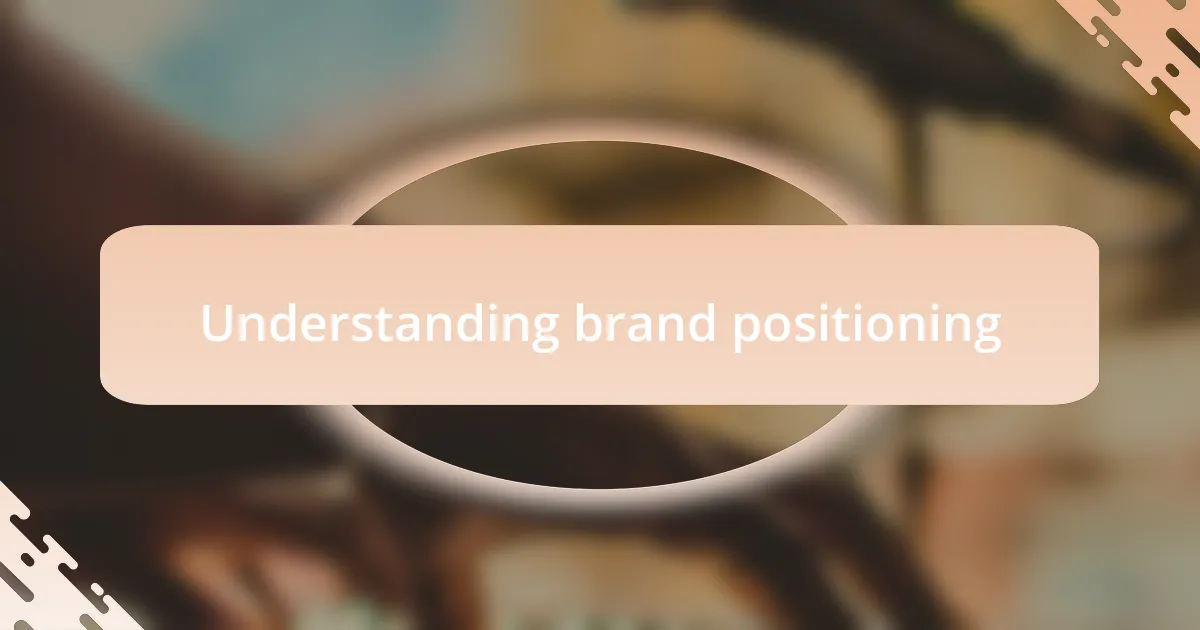
Understanding brand positioning
Brand positioning is all about carving out a unique space in the minds of your audience. When I first thought about my band’s identity, I realized it wasn’t just about our music, but also the feelings and experiences we wanted to evoke in our listeners. How can you create a brand that resonates deeply? It begins with understanding what makes you different.
One moment that truly shaped my understanding of brand positioning happened during a small local gig. While most bands focused solely on their sound, I noticed the audience responding to our storytelling between songs—our passion and personal anecdotes connected with them. That experience reinforced my belief that positioning isn’t just about the product; it’s about the narrative we tell and how we make our fans feel like part of something special.
Think about this: What imagery or themes come to mind when you think of your brand? I found that defining an emotional core helped us hone our message and streamline our marketing efforts. It was like unlocking a door to a more targeted audience, and that clarity was liberating. Understanding brand positioning helped us move from just being a band to becoming a memorable experience.
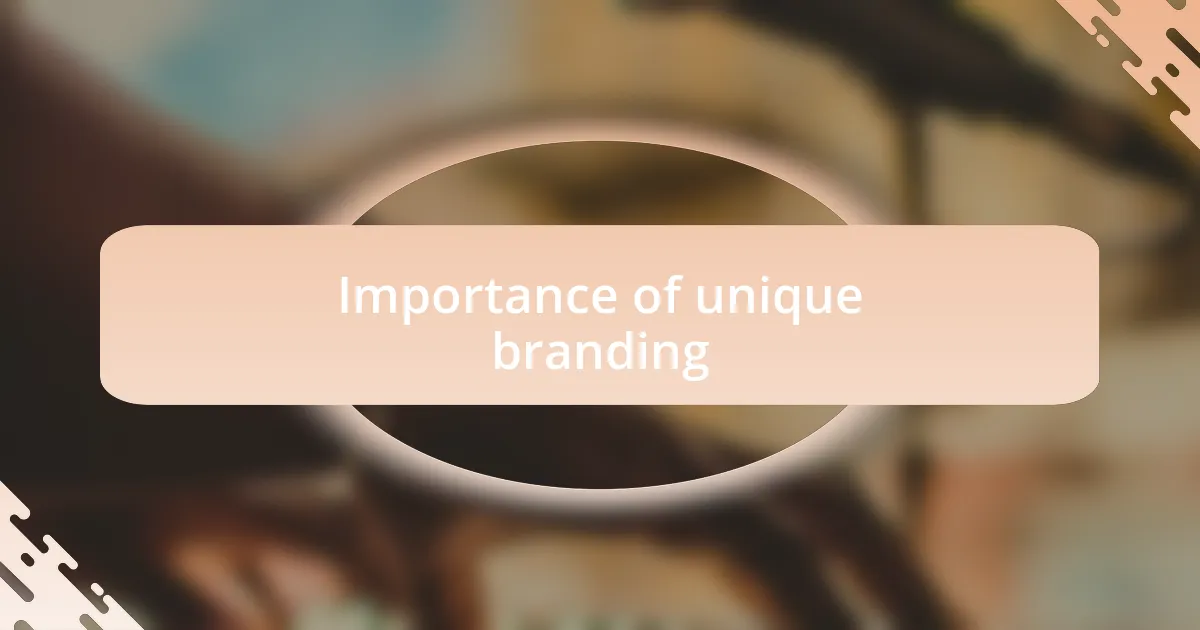
Importance of unique branding
Unique branding is essential because it sets you apart in a crowded marketplace. I remember launching my first single and thinking, “What makes us different from the other hundred bands out there?” The answer wasn’t just in our sound; it was in how we presented ourselves visually and emotionally. It’s like being on a stage—if you don’t capture your audience’s attention visually, you may lose them before you even get to the music.
When I decided to infuse elements of our local culture into our branding, I noticed an incredible shift in how people engaged with our music. This connection fostered a sense of community, making fans feel they were part of something bigger. Have you ever experienced the power of belonging? That’s what unique branding can create—an emotional bond between the artist and the audience, transforming casual listeners into loyal supporters.
In my journey, I’ve learned that unique branding isn’t merely an accessory; it’s the foundation of your identity. It allows you to communicate your values, vision, and authenticity in a way that resonates. I often ponder how my band’s unique story can influence someone’s day or inspire them in their own creative pursuits. Isn’t it fascinating how a well-defined brand can change perceptions and ignite passion?
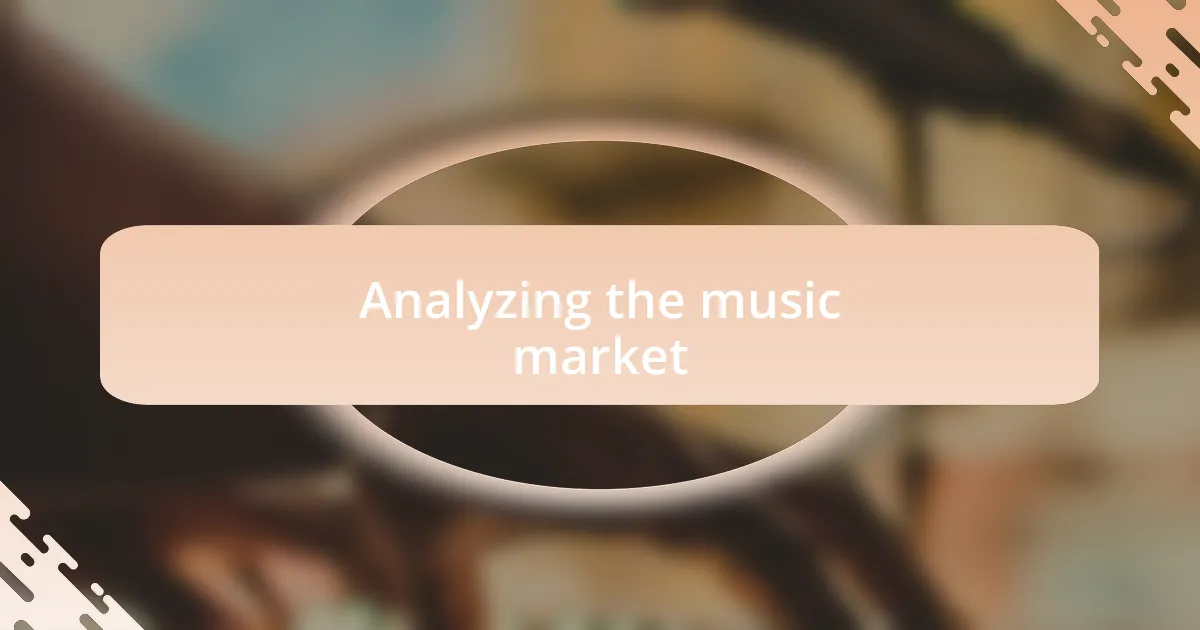
Analyzing the music market
Understanding the dynamics of the music market can seem daunting at first glance. From my experience, I’ve found that identifying your target audience is crucial. When I first started promoting my band, I observed that tailoring our music and messaging to reach a specific demographic made a significant difference in our engagement levels. It’s like fishing—if you’re not casting your line in the right pond, you might end up with nothing.
Market trends can shift rapidly, influenced by various factors like technology and listener preferences. I remember when streaming platforms began dominating the scene; that’s when I realized the power of digital presence. Adapting to these changes wasn’t just smart—it was imperative for survival in a competitive space. Have you ever had to pivot your approach based on new insights? It can be challenging, yet so rewarding when you see how it positively impacts your reach.
Analyzing competitors has also played a key role in my band’s growth strategy. I learned that taking notes on successful campaigns—whether it’s their social media tactics or album launches—can provide invaluable insights. Watching others succeed gave me ideas and the confidence to experiment. Since then, I’ve transformed my approach, which taught me that the music market thrives on innovation and adaptability. Isn’t it fascinating how we can learn from both successes and failures?
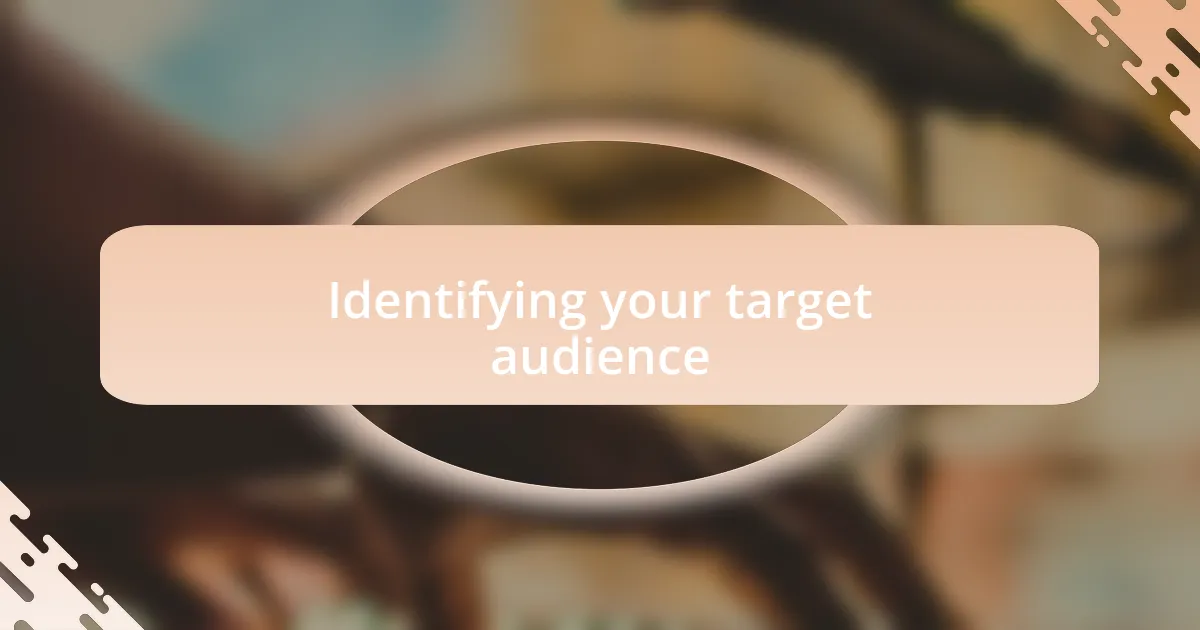
Identifying your target audience
Understanding your target audience is like discovering the heartbeat of your promotional efforts. Early on, I was eager to share our music with everyone, thinking broad exposure was key. However, I quickly learned the importance of narrowing my focus. Identifying who truly resonates with our sound—whether it’s indie rock aficionados or pop enthusiasts—has been transformative in shaping how I present our brand.
When I first attempted to create a campaign, I surveyed friends and fans to gather insights on what they loved about our music. Their responses uncovered insights I never expected, revealing age demographics, listening environments, and even preferred social media platforms. This feedback was eye-opening; it allowed me to directly connect with listeners on a deeper level. Have you ever had someone tell you exactly why they love something you’re doing? That sense of connection energizes my efforts and helps refine my approach.
To take it a step further, I regularly analyze online engagement metrics. Posts that generate the most excitement often correlate with specific audience segments. It’s fascinating to see how a simple shift in messaging or imagery can attract entirely different groups. I come away from these experiences feeling more empowered, knowing that identifying and understanding my audience isn’t just beneficial—it’s essential for building lasting connections. What about you? Have you found particular strategies that resonate best with your audience?
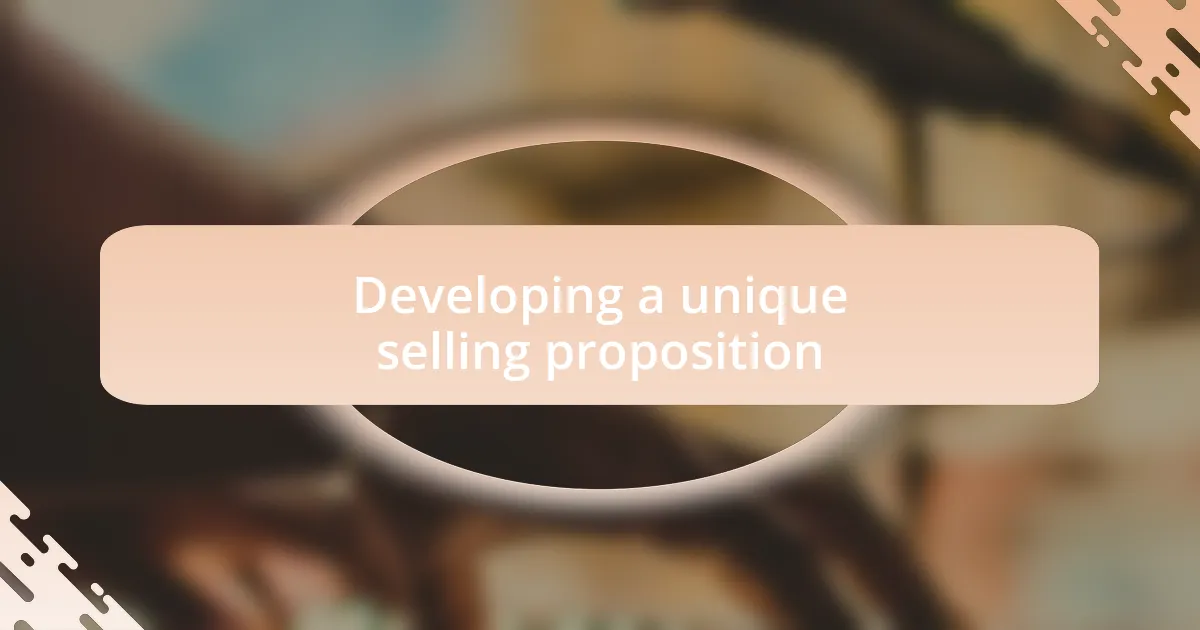
Developing a unique selling proposition
Developing a unique selling proposition (USP) is a critical step in distinguishing your brand within the saturated music industry. I remember when I first attempted to articulate what made our band special. I sat down with our musicians and asked, “What’s our story?” This question sparked a lively discussion about our influences, experiences, and the emotional journey behind our music. The process helped us hone in on a compelling narrative that truly represented who we are and what we wanted to convey.
Crafting our USP wasn’t just about the sound; it was about the genuine connection we aimed to foster with our fans. One experience that stands out for me was during a local gig when we shared personal stories between songs. The audience responded with enthusiasm, their reactions reinforcing the idea that authenticity resonates. Have you ever felt that electric atmosphere when someone shares a piece of themselves? That made it clear: our USP lay in our relatability and the invitation to join us on our journey.
To solidify our unique selling proposition, I created a simple yet powerful tagline that encapsulated our brand essence. It wasn’t easy, but it crystallized our mission into a few words. I often reflect on how this clarity helps guide our promotional efforts and artistic choices. A strong USP not only defines our identity but also provides a memorable anchor for our audience. What do you think? Can a well-crafted USP make that difference for emerging artists?
Crafting your brand’s story
Crafting your brand’s story is a deeply personal journey, one that transcends mere marketing. I recall sitting on a park bench, guitar in hand, reflecting on the early days of our band. It struck me that every chord we played was intertwined with memories—those late-night jam sessions and endless conversations about our dreams. Sharing those moments with our audience not only built our identity but also created a bond with listeners who felt our passion. Have you ever paused to think about the moments that define your own artistic path?
The beauty of a well-crafted brand story lies in its ability to evoke emotions. I remember when we recorded a behind-the-scenes video where we shared our struggles and triumphs while creating our debut album. Watching the comments roll in, filled with encouragement and connection, I realized that our story resonated on a much deeper level. The vulnerability we shared transformed our audience from mere listeners into a community. Can you recall a time when you connected with an artist’s story in a way that felt truly personal?
As we refined our narrative, I learned that specificity is key. Instead of vague statements, we focused on the distinct milestones and experiences that shaped our music. For instance, referencing the small café where we played our first gig not only gives our story authenticity but also invites listeners into our history. This detail makes our journey relatable and paints a vivid picture of who we are as a band. How are you embedding personal, specific moments into your own brand narrative?
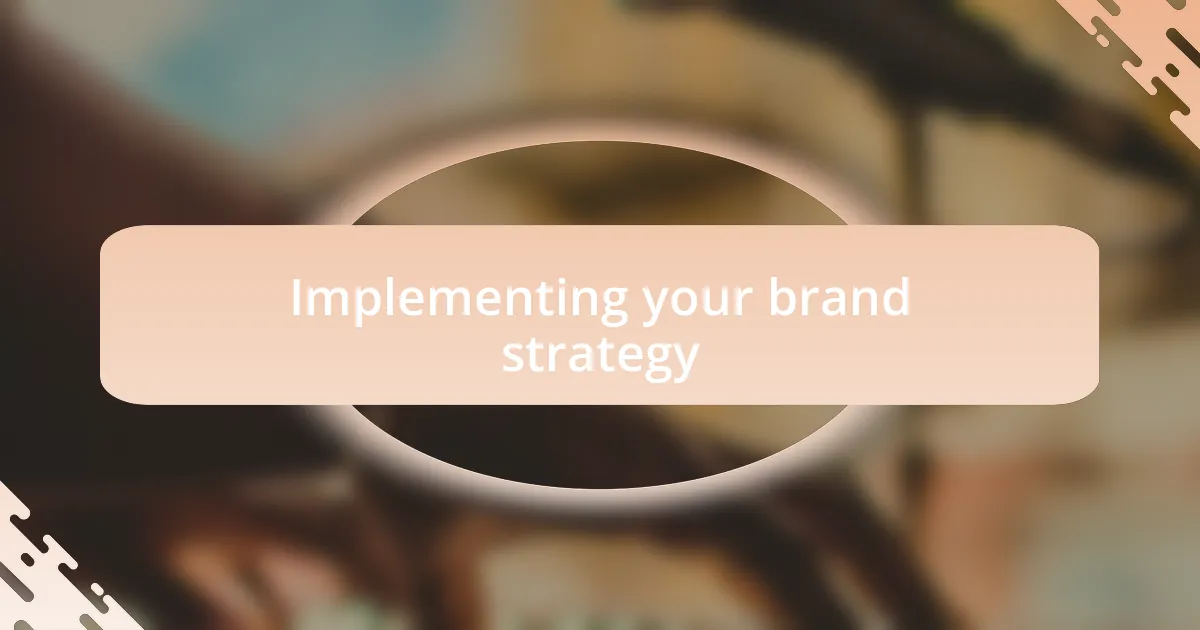
Implementing your brand strategy
Implementing your brand strategy requires a keen understanding of your identity and audience. I remember our early days when we mapped out our unique sound and visual style. Each band member brought a different perspective, and those discussions not only defined our artistic direction but also shaped the way we presented ourselves online. How often do you revisit the core values that guide your brand?
Using social media effectively is crucial in implementing your strategy. I observed how our consistent visuals—from album artwork to concert posters—created a cohesive image that fans recognized immediately. When we posted a sneak peek of our upcoming music video, our followers responded enthusiastically, excited to be part of our journey. Have you thought about how your online aesthetics reflect your band’s personality?
Engagement is just as important as presentation. In one instance, we hosted an online Q&A session, sharing our creative process and answering fan questions. Honestly, the insights and connections we gained during that interaction propelled our fan base and solidified our brand’s presence. Are you actively seeking ways to connect with your audience in a meaningful way?